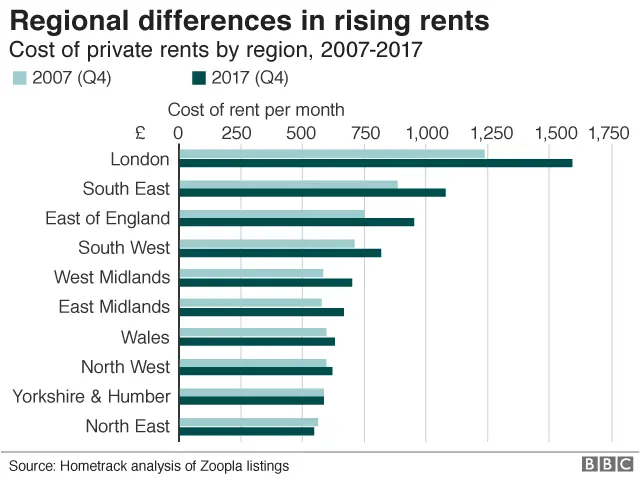Your six pros and cons of renting a home
 Getty Images
Getty ImagesRenting a room or a home from a private landlord is a reality for millions of people in the UK - but is it a positive or negative experience?
We asked you, via the BBC News Affordable Living UK Facebook group, alongside survey information from flatshare website Spareroom.com.
What emerged was a picture of uncertainty from tenants about their landlords' long-term plans, but also a feeling of freedom should they need to move for a new job or for somewhere better.
Here are some of the responses.
The pros
1. Flexibility
One of the biggest positives for many tenants was the ability to give relatively short notice, then move to a new home.
"I get to live independently and have the ability to move with more ease," says one tenant.
At a time when many young people are on short-term contracts or work on a freelance basis, such nimbleness can be vital for employment.
"I am still settling into a career in academia," says one post. "Until I know where I am going to end up, renting is best. It is good to know that when I am moving to a new area, I am not making a massive commitment."
2. Maintenance is the landlord's problem
The boiler breaks down or the roof leaks and all that is required is a call to the landlord.
Among the many expressing relief is one who says: "You don't have to think about house insurance and massive maintenance costs, although this does assume the landlords are doing their job."
Another says that, as a tenant, you do not have responsibility for the "big issues".
 Getty Images
Getty Images3. Getting to know you
Nearly a third of those asked in a survey of more than 13,000 flat sharers by Spareroom.com said that they chose to live with others as it was more sociable.
A number of people say that renting a room is a good way of meeting new people in a new area, or simply to help find their way around.
"It is useful to get to know a new area or country," says one.
The cons
1. Money matters
The vast majority (83%) of respondents in the Spareroom survey said that they rented in a house-share for financial reasons.
Yet, the costs involved in renting are a regular gripe. "You're paying someone else's mortgage" is a common refrain.
Rent levels are a worry for many, particularly those in more expensive areas of the country.

Fees. which many see as unreasonable, are facing a crackdown from the government, similar to a ban already in place in Scotland.
That cannot come soon enough, according to many tenants. "I pay a fee to renew every six months. I have no idea what that covers," says one.
2. Questionable landlords
There is concern about the number of landlords who fail to ensure that the property is maintained properly. The general view is that some bad landlords has given the sector a bad name.
Deposits are controversial. Some argue that a landlord expects too much, potentially withholding deposits for general wear and tear, or old things being thrown out.
"I can't wait for the day when I don't have to argue about why a three-and-a-half-year-old tin of paint the landlord left in my kitchen cupboard is no longer there," says one tenant.
Others worry that not every landlord is putting deposits into ring-fenced account. Across the UK, landlords must put deposits into a government-backed tenancy deposit protection scheme. Different schemes operate in different parts of the country.
 Getty Images
Getty Images3. Insecurity
Nearly half of those asked in the Spareroom survey said that being in control of when they move home is a key attraction of buying.
While renting does offer flexibility, one of the big fears among tenants is being told by their landlord that they will have to move.
One tenant sums it up by saying there is "constant uncertainty of [landlords] wanting to sell and therefore having to find somewhere else to live".
This has been tackled, to an extent, in Scotland where new rules require longer notice periods and other measures designed to increase security.
